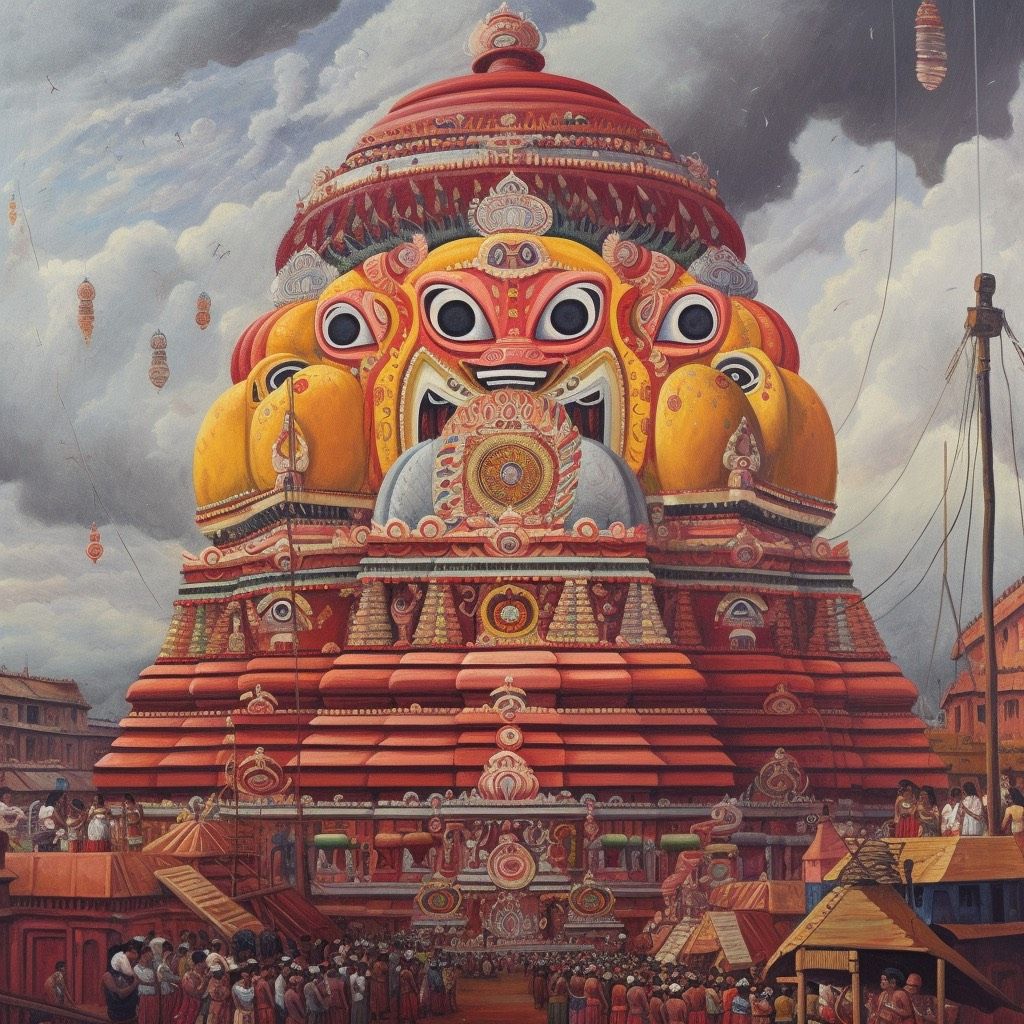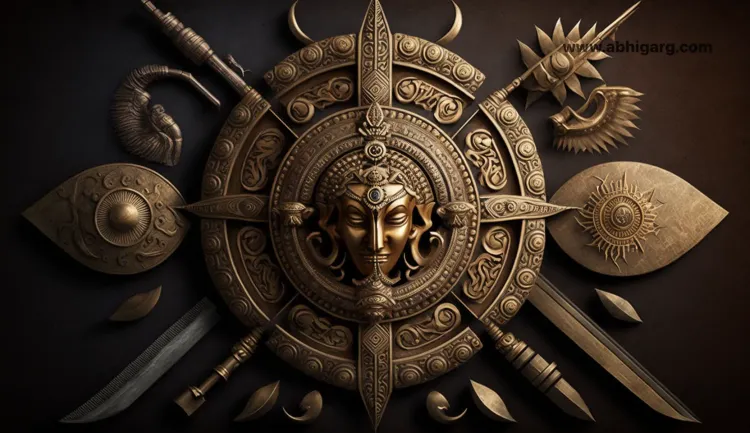Who is Saakshin Vishnu?

Updated: Sep 21, 2023
The term "Saakshin Vishnu" refers to the form of Lord Vishnu as an eternal witness. In Hindu philosophy, "saakshin" implies 'witness,' and Vishnu is considered the omnipresent observer of all actions, thoughts, and events.
Role in Philosophy:
In various Hindu philosophies, the idea of God as a "witness" is significant. It highlights that while individuals have free will, a divine presence observes without interfering in their choices. Saakshin Vishnu embodies this concept.
Scriptural References:
The concept is occasionally touched upon in texts like the Bhagavad Gita and Upanishads, although not consistently specifically named Saakshin Vishnu.
Cultural Impact:
The belief in a witnessing deity provides many individuals with a moral and ethical framework, reminding them that a higher power always observes their actions.
Who is Lord Jagannath?
Lord Jagannath is a deity worshipped primarily in the Indian state of Odisha and is a form of Lord Vishnu or Krishna. The name 'Jagannath' literally means 'Lord of the Universe.'
Iconography:
The wooden idols at the Jagannath temple in Puri, Odisha, are unique to Lord Jagannath. Unlike typical depictions of Hindu deities, these idols have large, round eyes and a simplified form, lacking arms and legs.
The wooden idols at the Jagannath temple in Puri, Odisha, are unique to Lord Jagannath
One of the most famous events associated with Lord Jagannath is the Rath Yatra, or Chariot Festival, in Puri. During this event, the deities of Jagannath, his brother Balabhadra, and his sister Subhadra are taken in grand chariots through the streets.
Cultural and Religious Importance:
Lord Jagannath is significant in Hinduism and has been integrated into regional and local traditions. The deity has influenced various cultural aspects, including art, folklore, and regional practices.
Global Influence:
The English word 'juggernaut,' which signifies an overwhelming and unstoppable force, derives from 'Jagannath,' symbolizing the massive and awe-inspiring chariots in the Rath Yatra.




The majestic Rath Yatra Celebrations in Puri, Odisha. Representative Images.
The intersection of God Saakshin Vishnu and Lord Jagannath:
While both are forms of Lord Vishnu, they serve different roles and are worshipped in other contexts.
Saakshin Vishnu is more philosophical, while Lord Jagannath is more culturally and ritually specific to certain communities, especially in Odisha.
Both forms, however, embody aspects of the divine that are important in understanding the multifaceted nature of Hindu beliefs.
In summary, Saakshin Vishnu and Lord Jagannath are significant but distinct aspects of the divine in Hindu tradition. While Saakshin Vishnu is an eternal witness to the universe, Lord Jagannath is a more culturally specific deity with significant regional importance. Both, however, enrich the tapestry of Hindu spirituality.
Bhagavad Gita, Chapter 13, Verse 23
God Saakshin Vishnu: A Deeper Look
Form and Iconography: Since Saakshin Vishnu is more a philosophical concept than a deity worshipped in a specific condition, there isn't a standardized iconography for this aspect of Vishnu. Typically, Lord Vishnu is depicted lying on the serpent Ananta, with Goddess Lakshmi at his feet. Still, these images usually represent Vishnu more generally than specifically Saakshin Vishnu.
Role in Vedanta Philosophy:
The "Saakshin" or witness is often elaborated upon in Vedantic philosophy. The Saakshin is considered the pure consciousness that observes the mind, body, and the world but remains untouched by it. While Saakshin Vishnu is not explicitly named in these texts, the concept aligns closely with this aspect of Vishnu.
Universal Omnipresence:
The idea of Saakshin Vishnu aligns well with the belief in his omnipresence. As the eternal witness, Saakshin Vishnu's presence is felt everywhere, observing the deeds and actions of all beings.
Ethical and Moral Implications:
The belief in a divine observer often serves as a moral compass for individuals. One should act righteously whether or not fellow humans are watching them because the divine witness is always present.
In Literature and Culture:
While not as popularly worshipped as some other forms of Vishnu, the concept of God as an eternal witness often appears in Hindu literature and discussions on dharma (righteousness) and karma (action).
So, while Saakshin Vishnu may not have a distinct form or body that is worshipped separately, the concept is deeply ingrained in Hindu philosophy and ethics. It serves as a reminder of the constant divine presence that observes but does not interfere, guiding believers in their moral and spiritual journeys.
Documented References and Related Concepts
Upanishads:
The idea of a "witness consciousness" is prominent in the Upanishads, ancient Indian philosophical texts. For example, in the Mandukya Upanishad, the "Saakshi Chaitanya" or "witness consciousness" is not specifically about Lord Vishnu.
Bhagavad Gita:
While the term "Saakshin Vishnu" might not be explicitly mentioned, the Bhagavad Gita does touch upon the idea of God observing the actions of individuals. Lord Krishna, considered an avatar of Vishnu, often speaks in a way that alludes to the divine's role as an observer of human actions.
Vishnu Purana and Other Puranas:
These are collections of myths and legends that often discuss the various forms and avatars of Vishnu. While the specific term "Saakshin Vishnu" may not be present, there is a general emphasis on Vishnu's omniscience and omnipresence.
Advaita Vedanta:
This non-dualistic school of Hindu philosophy emphasizes the "witness consciousness" as the true self. Again, while not explicitly named Saakshin Vishnu, the concept aligns well with this aspect of Vishnu.
Contemporary Spiritual Literature:
Modern-day gurus and spiritual teachers often discuss the concept of a "witnessing presence" in their interpretations of Hindu philosophy. Some may refer to this as Saakshin Vishnu, though this is more of a contemporary usage.
Regional Traditions:
While not strictly "documented," many local and regional traditions in Hinduism may have their interpretations or names for the concept of a witnessing deity.
In summary, while the term "Saakshin Vishnu" may not be ubiquitously documented in canonical texts, the concept it represents is woven into Hindu philosophy and spirituality. It's often the subject of interpretation and commentary, both ancient and modern.



